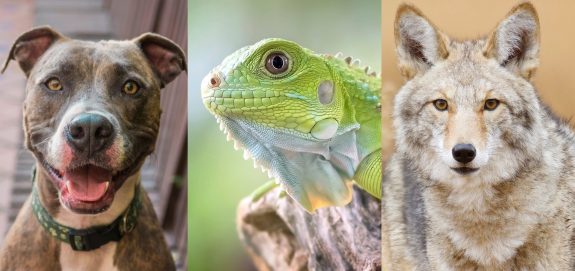Restricting Ownership of Exotic Animals
Governments around the world are increasingly recognizing the need to enact laws guided by the concept of The Five Freedoms – including freedom from fear and distress, freedom from pain, injury or disease, and freedom to express normal behaviour. Sadly, millions of animals around the world are currently suffering as a result of the global wildlife trade, with many destined to be kept in people’s homes or private zoos. Canada is home to approximately 1.4 million exotic pets. For many of these animals, a life in captivity cannot meet their physical, social, and psychological needs. For instance, Ball pythons – a species native to Africa – live in grasslands, shrublands, and open forests. In captivity they are commonly held in small terrariums or plastic containers and prevented from engaging in natural behaviours. Canada is one of the main importers of Ball pythons globally. The exotic animal trade, and the keeping of exotic animals as pets, also poses significant human health and safety risks, including the emergence and spread of new zoonotic diseases. Based on the best available science, and guided by The Five Freedoms, the City of Winnipeg is proposing to restrict the types of animals that can be kept in city limits by creating a “positive pet list”. This is the best approach to restricting exotic pet ownership because it is concise, simple to understand, and can be easily amended and enforced by the City. In contrast, establishing a list of prohibited animals would place the onus on the City to monitor and identify species being kept privately in Winnipeg homes, and would leave the City to play a never ending game of “catch up” as new species are brought into the province. A positive pet list approach puts the onus on those seeking to keep a new species of animal in the City to prove that the species can be kept safely and in a manner that respects animals’ basic biological and social needs.Stopping Irresponsible Dog & Cat Breeders
Winnipeg is proposing to require a breeding permit for all breeders of dogs and cats. By requiring, among other things, a veterinarian reference, history of responsible ownership, and an inspection of the breeding property, such a permitting system would be an important step forward in the fight against puppy mills and other unregulated pet breeding facilities. Puppy mills and unregulated breeders often place profit over the well-being of the animals, and also fuel the overpopulation of cats and dogs in Winnipeg and other cities across Canada. The City of Winnipeg is also proposing to limit the number of litters that an animal can be made to produce. This would ensure animals’ health and well-being is not put at risk by continual breeding over the course of their lives. But we are urging the City to go even further and limit the number of breeding animals allowed at a given facility. This would help prevent overcrowding and neglect.Eliminating breed-specific legislation
The City of Winnipeg and the Province of Ontario are the only major jurisdictions in Canada with breed specific legislation that prohibits the keeping of companion dogs belonging to certain breeds, including American Pit Bull Terriers, Staffordshire Bull Terriers, and American Staffordshire Terriers. A Private Member’s bill was recently introduced in Ontario aimed at repealing that province’s ban. Although the rationale for bans on pit bulls and pit bull-type dogs is to promote public safety, the truth is that breed specific bans are unscientific, ineffective, and extremely dangerous for dogs. By targeting dogs based on appearance, and not their individual personalities and behaviours, breed bans fail to tackle irresponsible dog guardianship – the root cause of dog bites and other public safety risks. In order to protect animals and the public from dog bites and other safety risks, the City is proposing to take additional steps to address irresponsible pet guardianship, including by prohibiting 24/7 chaining or tethering of dogs and 24/7 outdoor dog housing, as well as creating categories for animals kept by irresponsible guardians.Prohibiting the Dangerous Use of Poisons & Lethal Traps
The City of Winnipeg is proposing to prohibit the use of outdoor lethal traps (including leg hold and snare traps), as well as rodenticide poisons. This is for good reason. Traps can cause extreme suffering on the part of animals, including both wild animals and companion animals. Rodenticides also cause animals to experience a slow and painful death, and can affect a range of non-target animals who consume poisoned baits or the bodies of other poisoned animals.Protecting Companion Animals from Cruelty & Neglect
As discussed above, Winnipeg is proposing to prohibit the 24/7 tethering and outdoor housing of dogs, and to take steps to address irresponsible guardians of dogs. The City is also proposing to prohibit keeping animals in parked vehicles in extreme heat and cold – an important move to protect unnecessary suffering on the part of animals, not to mention wasted resources on the part of Winnipeg Fire Paramedic Services who frequently respond to incidents called in by concerned members of the public.Prohibiting Cruel Glue Traps
The City of Winnipeg is proposing to ban glue traps, which use a strong adhesive to catch mice and rats. Once stuck to the trap, animals – including rats and mice, as well as other small non-target animals such as birds, reptiles, and amphibians – often die a long, agonizing death caused by starvation, dehydration, and exhaustion. Animals desperately try to free themselves, which only causes them pain and to become further adhered. These cruel and archaic products should be banned in Winnipeg and across Canada.Act Now!
City Staff need a strong show of support for their bold and progressive proposals. The exotic pet industry and Winnipegers who keep exotic birds as pets have launched a campaign to oppose parts of the proposal. Please take a moment to tell the City that you support its proposal to take strong action to protect companion animals and wildlife from suffering, neglect, and cruelty.Join the Animal Justice mailing list




